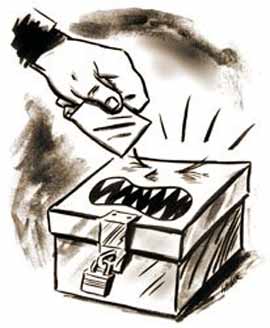
There's no such thing as voter fraud, as the Democrats and right-thinking press mavens have been telling us for weeks, but some curious things are happening out there in flyover country. Some of the assurances that all is well on the old ship of state have been caught in what looks suspiciously like the rigging.
Early voters in Texas say the voting machines are flipping their votes. These voters marked their ballots for Donald Trump, and when the machines enabled them to review their work, the votes had been flipped to Hillary Clinton.
Votes for Republicans in down-ballot races were not flipped. No doubt a coincidence -- but it seems to be a law of the cosmos that votes are always flipped from Republican to Democrat -- or it might be a clue to why Democrats have been growing increasingly confident that this year they will flip the state from reliably red to an un­natural shade of blue.
Election officials put the glitches, if glitches they are, to "user error," and say "the machines are fine," as apparently they are if you're of the Hillary persuasion. Nevertheless, Gov. Greg Abbott, a Republican, has urged voters to check and double check the way they mark their ballots before actually casting the ballot. Machines are not infallible, though they're often described that way, like a fast-talking salesman pushing a cosmetically enhanced clunker off a used-car lot.
Voting machines have shortened election night; votes are far more quickly counted now that a machine, sometimes a computer, does the counting. Who would accuse a computer of acting up? Nevertheless, the famous boast of Earl Long, the late governor of Louisiana, that he could make voting machines play "Home on the Range." becomes more credible with every election. Fraud doesn't happen as often as losers say it does, but it happens more often than the winners say.
The expansion of absentee voting, including early voting, offers new opportunities for manipulation. Voters in six states started voting this week, and by Saturday night voters will have marked ballots in 12 states and the District of Columbia. According to the National Conference of State Legislatures, about a third of the nation's voters will have cast ballots by Nov. 8, which is what was once accurately called Election Day.
Wendy Underhill of the legislative conference says her organization has traced absentee voting, the precursor of early voting, to Louisiana (where no one ever dies of fraud shock) in 1921. But manipulation of an election by absentee and early voting, first called "excuse-required absentee voting," started earlier than that.
"Excuse-required absentee voting started during the Civil War," says Prof. Paul Gronke of Reed College and director of the non-partisan Early Voting Information Center. Abraham Lincoln and Gen. George B. McClellan, who turned out to be no better at politics than he was at making war, were locked in a spirited presidential race in 1864. "Lincoln," says the professor, "wanted to assure that he got the votes of the soldiers who were serving away from home."
Early voting, when voters did not need an excuse for voting late, started in California, where many bad things start, in the early 1970s. The state was dealing with "an increasing number of people who were simply lying," Prof. Gronke tells Time magazine, "by saying, 'I couldn't make it to the polling place,' when it was clear that they had a really long commute or it was otherwise inconvenient to make it."
Convenience easily trumps citizenship in an era when a lot of things are just too much trouble to do well. Oregon conducted a primary election to replace U.S. Sen. Robert Packwood, who had resigned when he tipped his hat to a lady in an elevator and was accused of sexual harassment, in 1995. Five years later Oregon became the first state to conduct all voting by mail. The state of Washington soon followed, and then Colorado, and the race was on.
Soon no one would listen to the skeptics who reminded the convenience-seekers that early voting makes a mockery of Election Day. Voters who mark their ballots a fortnight early are not participating in the same election as those who wait for the first Tuesday after the first Monday in November, as prescribed by the law obeyed by everybody else. But 37 states now offer early voting.
No machine, early or late, makes voting as much fun as it was with paper ballots. In some states voters marked their fa­vorite not with an X in a little box, but by scratching out the names of all other candidates. Nothing was as satisfying as scratching through the names of despised politicians with the stub of an Eberhard Faber No. 2. I always went home with a smile on my face.
Comment by clicking here.
JWR contributor Wesley Pruden is editor emeritus of The Washington Times.


 Contact The Editor
Contact The Editor
 Articles By This Author
Articles By This Author